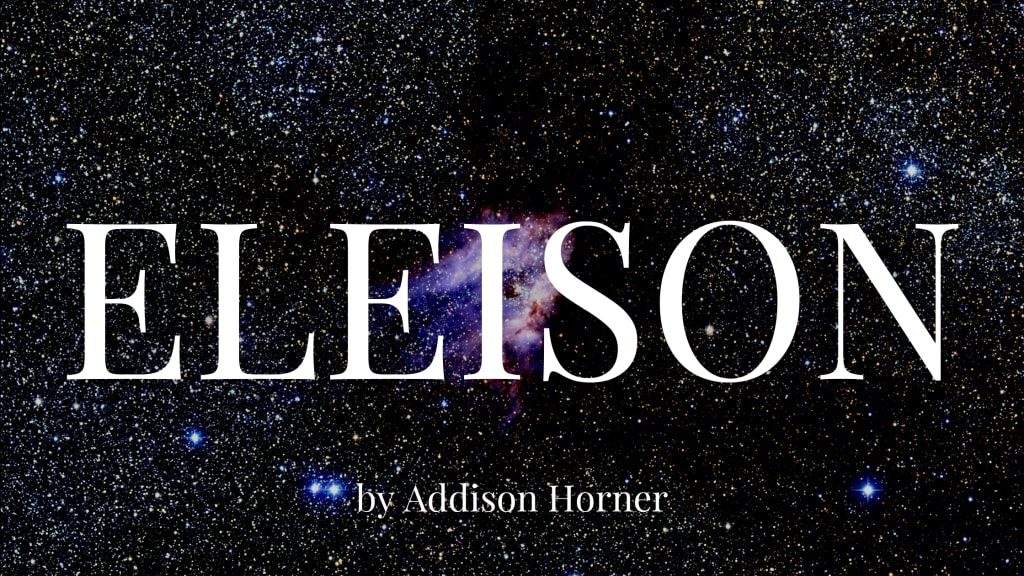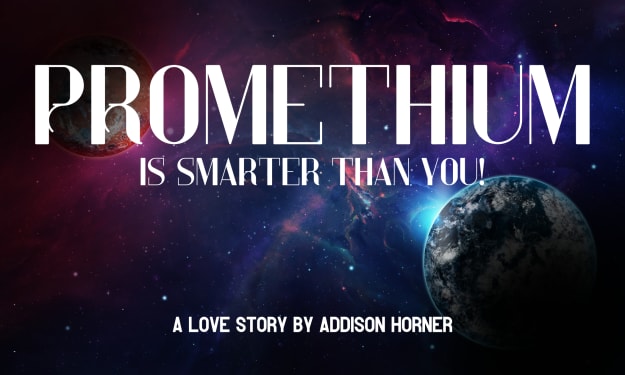Eleison
Every star has a song.

Nobody can hear a scream in the vacuum of space, or so they say. But Mother swore by the songs of the stars. Planets and moons and even the meteors sing to us, if only we have the ears to listen, but the stars own the grandest voices and the sweetest stories. I always thought it was nonsense until the day I took my first spacewalk.
I stepped onto the dock just after sunrise, still rubbing the sleep from my eyes. Mother was unlatching the last pair of lunar charging cables from Orpheum’s hull. The gleaming golden plates hummed as they soaked up Eleison’s first rays, and Mother hummed along. While I still heard no music from the morning light, I did hear Mother’s soothing melody, a gentle gathering of major thirds and perfect fourths.
Noticing my raised eyebrows, she smiled. “The song of mercy,” she said, as if that explained everything.
Our home platform hovered high above the surface of Dunwatch, a cosmically minuscule rock inhabited by half a million weathered souls. One of those souls—my father—stepped down from Orpheum’s ramp, flight helmet and goggles hanging from a strap around his neck. If Dunwatch were ever to take on human form, it would look like this man, stoic and strong and uncompromising.
“Eurydice,” he said, “put on a suit.”
I blinked at him, trying to process what he’d said, and pointed at myself in dumb confusion.
“A suit,” Father repeated. “You’re walking today.”
I squealed so loudly that Father covered his ears as I sprinted the length of the ramp to embrace him. I had been constantly begging him for this opportunity since my tenth birthday. Being the oldest daughter hadn’t been enough to justify a spacewalk in his eyes. But I turned sixteen last month, having spent the last six years developing an eager, nagging persistence. I must have worn him down.
Either that, or Mother got to him.
“Airborne in ten,” Father said, his voice thick with discomfort. He wasn’t a hugger. I was, though, so I squeezed him one more time before racing up the ramp.
Orpheum’s cabin was a cramped double-aisle with clear collection vats stacked head-high between two rows of jump seats. Ducking under the pipes that ran from the vats to the ceiling, I found the storage locker and grabbed the smallest of three suits hanging inside. I’d tried it on a dozen times, but today would be different. Today, I would walk in space.
Suit on, clamps tightened, glass-plated helmet snapped into place, I tapped my foot in a staccato frenzy by the cockpit as Father ran through the familiar preflight checklist. Mother donned her own suit and closed the ramp behind us. She winked at me as the hydraulics hissed, sealing us in. I winked back and grabbed the handrail above my head.
“Engines on,” Father said over the intercom. Orpheum came to life with a bellowing yawn, as if stretching his limbs after a long slumber. Yes, our ship was definitely male, a grizzled old boy with half a dozen pending health conditions and a mischievous spirit. As if reading my mind, Orpheum coughed out a burst of black smoke from his forward exhaust vent.
“He’s fine,” Father said, as he did every time Orpheum displayed any symptoms. “Just clearing the gunk from his throat.”
Orpheum rose into the cloudy dawn, batteries freshly charged by the light of Dunwatch’s twin moons. I studied Father’s hands on the controls; they maneuvered us up and away from the dock with careful skill. The winds pummeled Orpheum’s hull as he ascended through the cloud cover and into the upper atmosphere.
“Can you hear it now?” Mother asked, Eleison’s light sparkling in her eyes. I shook my head but grinned anyway. I was more than happy to humor her imagination.
Orpheum’s engines thrummed in a pleasant rhythm as the winds died down. We had reached the edge of space, where the broad sky met the infinite void. Streams of colored gases flowed around us — purples and cyans and alabaster whites. They reminded me of the mossflowers that grew on Dunwatch’s surface, except that mossflowers were disgustingly greasy growths in the pitted rock, while these celestial colors unfolded in glorious undulating petals against the starry tableau.
The colors were the reason we came up here. When gas deposits from passing meteors or astral waste came into the planet’s orbit, they hung around the edge of the gravity well. It happened a lot out here, in the boonies of the galaxy. Better to deal with astral waste than tourist traffic.
When Father’s ancestors learned how to collect the deposits of nitrogen and helium and whatever else happened to show up, Dunwatch became a haven for the downtrodden, cast-out second-chancers of humanity. It was a hard life, with long hours, rock-bottom wages, and no prospects. But it was still life.
Mother tapped Father’s shoulder and gestured upward, to the blue-blackness of space beyond the atmosphere. Father nodded and took us higher, through the final layer of oxygen-enriched air and into open space. The colors faded into a blurry tapestry beneath us.
Father sealed the cockpit door, leaving Mother and me alone in the cabin. She looked over my suit, and I looked over hers, checking for rips or loose clamps. Satisfied, Mother hooked our carabiners into Orpheum’s safety lines, then gave me a thumbs up. I returned it. She pulled the lever that opened the ramp into the vacuum of space—
And I heard it. The Song of Eleison.
The bright white star gleamed in the distance, millions of miles from our feeble bodies, but the song resonated in my bones as if it were a secret whispered in my ears. The melody exploded into life, bold and clear and beautifully familiar. I had been seeing the world in three dimensions; now the music beckoned me into a universe of four. It bade me dance. It bade me live.
Then the harmony rose up underneath, sonorous chords blazing in a fiery rhythm, at once soaring and subdued. I had heard a pale imitation of this soundscape before, strummed on Mother’s guitar on quiet evenings. That had been pretty. This was terrifyingly beautiful. Beautiful, beautiful, beautiful, the sensation that rang in my ears and begged me to sing along.
This melody had a name. Mother had taught it to me long ago, but now I knew. This was Eleison, the Song of Mercy. No other title would fit.
I stood at the edge of the ramp, feet hovering over its lip in zero gravity, tears running like sweet rivers down my cheeks. Mother put a gloved hand on my shoulder, and we smiled at each other.
“You were right,” I whispered. “I hear it.”
Father’s voice crackled over the intercom, breaking our reverie. “Guess I don’t got what it takes to listen,” he said.
Mother and I ignored him as we got to work. I could barely concentrate as we dragged out a pair of thick vacuum hoses and activated the suction. Noise from the collection vats seemed distant and unimportant, as did the thrumming of the engines when Father steered us through a nearby cloud of gaseous pinks and greens. The Song of Mercy was everywhere, filling the void of space and seeping into my skin. Like a cleansing fire, it scoured my mind of all concerns, refining every atom as it washed over—
“Eurydice!” snapped Mother.
I grudgingly forced my attention back to the present. “Mother?” I asked.
She was staring slack-jawed at something beyond the curve of Dunwatch’s atmosphere. When I saw it, my jaw dropped too.
It was larger than any ship I’d ever seen, sleek and majestic and mighty. It was also on fire. The massive spacecraft had to be a mile long, brimming with defensive battlements and ion catapults and static generators. The whole thing was covered in dull gray plate punctuated by dozens, hundreds of spurts of fire that blossomed and died in the void. The ship didn’t sail through space; it limped, or maybe just crawled.
“That’s a battleship,” Father said. “From the Centersphere.”
“Is it in trouble?” I asked, unable to tear my eyes away.
Mother grabbed my arm and pulled me back into the cabin. “Aegis,” she said, “take us home.”
The ramp started to close as Father set Orpheum on a gradual loop back to Dunwatch. I peered over the lip to watch the Centersphere battleship veer starboard, turning back to face the way it had come.
Eleison’s song still rang in my ears, but another melody had joined in, creating moments of dissonance that pricked at my brain like needles. It was unfamiliar, but not entirely unpleasant. Another song, from another star?
Before I could ask Mother, the blackness beyond the battleship shimmered and warped with crisscrossing streaks of maroon and azure. A different ship emerged from the darkness, a behemoth of midnight metal bathed in a violent purple hue. It was smaller than the battleship, but more vicious, bristling with spiky ornaments too far off to see clearly.
Then another ship followed, and another, until seven spacecraft faced off against the lone battleship.
The ramp sealed. I grabbed Mother’s arm as the artificial gravity returned. My muscles trembled, and my legs felt weak. Mother helped me sit in one of the jump seats. Even through the helmet, I could see her complexion turn an ashy white.
“What do we do?” I asked.
“Aegis, go!” Mother yelled.
Father gunned the engines without a word. The acceleration nearly threw me from my seat as Orpheum completed his arc and raced toward the safety of the planet. I heard noises in the distance, impossible ones, explosions and hisses and screams that defied the vacuum between us and the warships. After all, sound couldn't travel through space.
But I had heard Eleison’s song. And as I closed my eyes to focus on that soothing melody, another song rose to meet it. Not the slightly dissonant tune from before, but a sinister one, discordant sixths and minor seconds in erratic hemiolas that defied all natural rhythms. It screamed in my ears, straining against the Song of Mercy with unbridled fury, and I knew its name as surely as I knew my own.
“Egro,” I whispered. The Song of Wrath.
Mother had stripped off her helmet, and she lay on the floor of the cabin with hands clamped over her ears. She was screaming in the key of Mercy. Father yelled something over the intercom, but my panicked brain couldn’t interpret the noise as words. I fumbled at my helmet’s safety seal, but the latch caught on my glove and wouldn’t release.
“Father!” I cried out. “Something’s wrong! The song, it’s all just wrong!”
“Eurydice!” Father yelled. “Catania, help her!”
Mother whimpered at the base of the ramp. Egro’s song grew louder, creeping toward us, closing in with ferocious precision. Percussive thrusts, stabs of high-pitched strings in detuned trios, blaring horns in atonal clusters, a cacophony of chaos that burst into—
Something exploded just outside the ship.
The energy blast seared Orpheum’s hull and ripped away the boarding ramp. I grabbed the handhold above my head and stared in horror as Mother flew past the edge of the cabin. Her safety line, strained by Orpheum’s acceleration, snapped.
Helmet-less and alone, Mother tumbled into the vacuum.
“Catania!” Father shouted. But Mother was gone.
Orpheum spun dizzily toward Dunwatch’s upper atmosphere. The g-forces slammed my body into a seat and shoved my brain against the back of my skull.
I screamed into the void. The Song of Wrath overwhelmed my senses as I sank into unconsciousness.
About the Creator
Addison Horner
I love fantasy epics, action thrillers, and those blurbs about farmers on boxes of organic mac and cheese. MARROW AND SOUL (YA fantasy) available February 5, 2024.







Comments
There are no comments for this story
Be the first to respond and start the conversation.